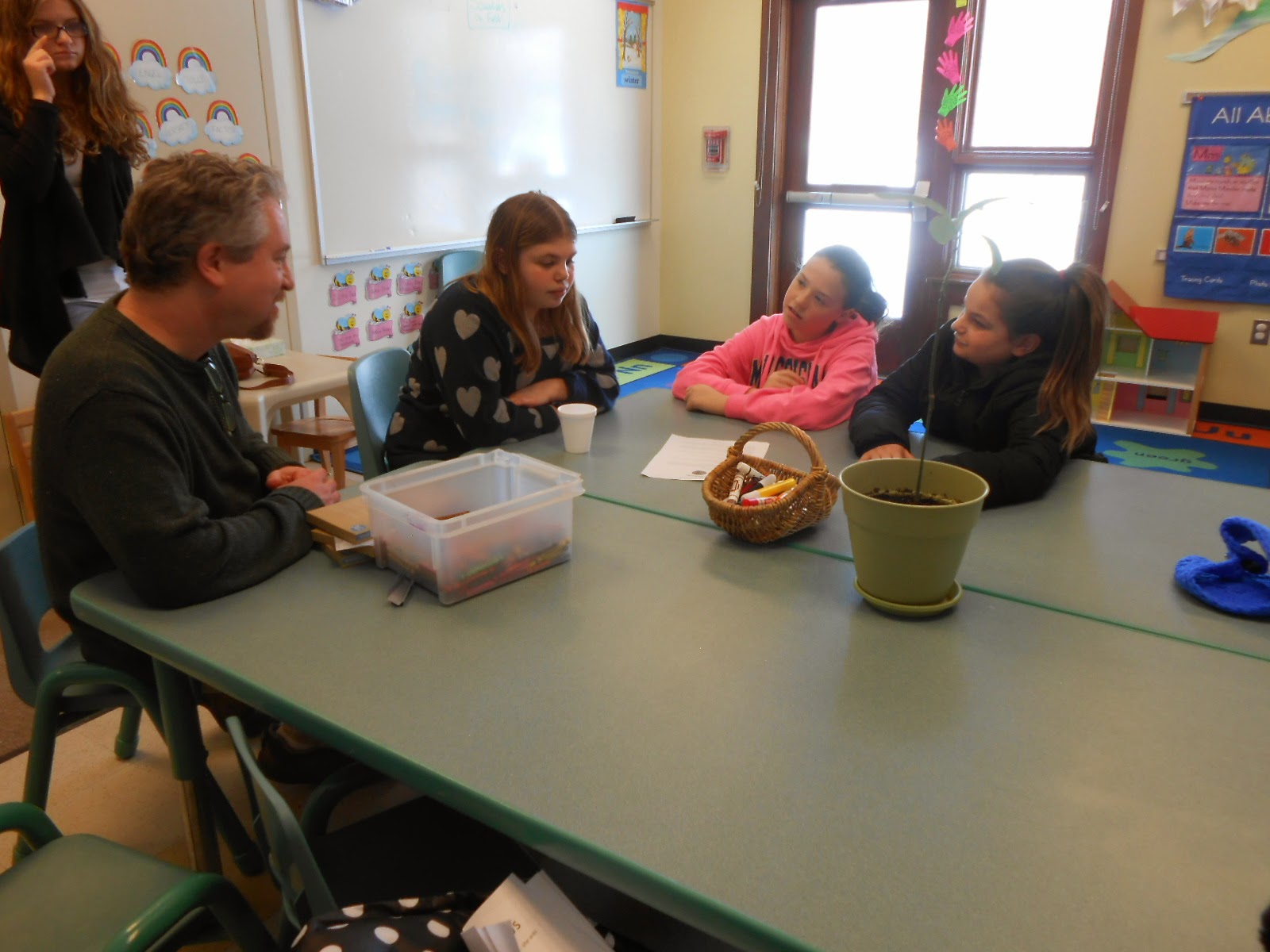Grade 3
In Mrs.Gabay’s class,
we read Lekh Lekha, one of the first Torah portions, and about the first Jewish
person! Just like with the last Torah portion that we looked at, we raised questions from the text that helped connect the text to our lives. One example is a question that helped us talk about journeys, “Why
did God choose to ask somebody who was 75 to go on such a large journey?”
Meanwhile, in Mrs.
Zaas’ class, we looked at the categories of G’milut Chasadim (Acts of Loving Kindness). The categories were written in
Hebrew and English so we tried to read the Hebrew words using our notes.
Then we tried to come up with examples for each category.
We connected all of our learning together by talking about G'milut Chasadim in the story of Purim!
Grade 4
Today in Grade 4, after T’filah and Kehillah we
split into our two classrooms. In Mrs. Abrams class, we reviewed upstanders and
bystanders. An upstander is someone who stands up and does good for someone
else or something they believe in while a bystander is the opposite and someone
who does nothing. We brought up the quote, “It’s not upon you to complete the
work, but neither are you free to desist from it.” We spoke about this quote
because it ties together our curriculum of upstanders and bystanders. It is
important because we believe and realize that we cannot completely solve a
problem, but it is important to do our part. We then discussed what we think the word "work" means and the difference between "a career" and "work." Afterwards, we
split into two groups. Each group got a die with questions about being an
upstander. As a group, we rolled the die and discussed the question that the
die landed on. After this activity, we made our own cubes and drew pictures or
wrote six different things we felt an upstander would do.
In Mr.
Stone’s class, we were paired up and given a series of scenarios relating to Shalom Bayit (our obligation to strive for peace in our homes) with
different choices of what to do. Different choices scored different points.
For
example, in the example: “it is suppertime and your family is seated at the
table. Your mom or dad serves a tuna casserole and a delicious salad. You hate
tuna casserole. What do you do?” “You mention that you dislike tuna casserole
and you eat salad,” scores one point. The option, “You eat salad and ask if
your mom or dad could make one of your favorite dishes tomorrow night,” scores
two points. The choice, “You eat salad and compliment your mom or dad on how
delicious it is,” scores three points, while the option, “You announce that you
HATE tuna casserole,” scores zero points. Other scenarios included, losing a
Game Boy that belongs to your sibling, having to leave the house before
completing your chores, struggling to finish your homework while your parent is
busy, having to share the television with your family among other
scenarios.
After
our Judaics classes, we all joined together for Hebrew with Mr. Stone. We started the by being
asked how we were doing in Hebrew. We learned how to let someone know how we are feeling in modern Hebrew! After discussing how we were, we talking about Madrashim (lessons) and learned a Midrash (lesson) on the first time Mi Chamocha was read because we are
finishing up on learning the prayer. We finished the day by reviewing the
prayer.
Grade 5
During T'filah today, we found out that next
week is Purim! We also learned about the Purim carnival, which is next week. We talked about why
we boo Haman (the reason being because he was a bad person). Rabbi and Cantor taught us that even though there are people who want to do bad, we shouldn't fight evil by becoming evil. During Kehillah, Mrs. Milgrom reminded us that school starts at 10:30 am on Sunday, March 1!
In Mrs. Zamir’s class, we talked a little about
the Retreat coming up March 6-7. Then, we
started reading a new text for Philosophical Inquiry. This one was about Parshat Noach. A lot of our questions focused on a strange part of the text having to do with animals, so as a class we decided to further explore material dealing with what foods we eat and why.
With Ms. Silverstein, we began with Birkat ha
Torah and tzedakah. We also reviewed the what is contained in the TaNaCH. It opens left to right, and we found where the Torah ends and the book of Nevi'im (Prophets) begins. Next we talked about what a
prophet was, beginning by doing a worksheet. We discussed the role of prophets. We made ‘Prophet Wanted’ ads to illustrate the necessary characteristics of a prophet.
During Hebrew with Mrs. Zamir, we began by
talking about the date, the month, and the weather all in Hebrew!
After, we tried to memorize the vocabulary of a
prayer by making a fun song.
Grade 6
Today in Grade 6 we were split up into groups. Each group was given a world issue to illustrate on a poster. Molly, Isabelle and Ilana
had the topic “protecting the earth.”
Sydney and Taylor had “the care and protection of animals.”
Their poster showed the class how to treat animals and how not to treat animals.
Everyone presented their posters to the other groups.
Then, we broke out in small groups to discuss a story called The Hands of God, written by Lawrence Kushner. The story helped us think about how humans are like God's hands. Our G'milut Chasadim unit will focus on what this means in terms of our obligation to address World Issues.




















No comments:
Post a Comment